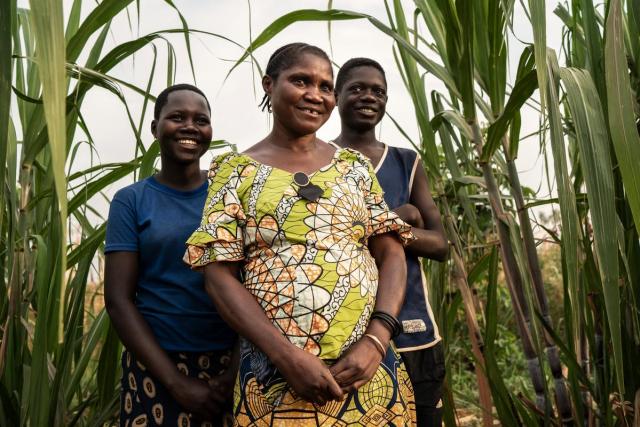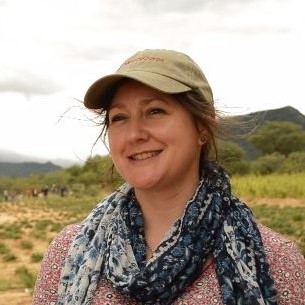The Permagarden Pathway to Resilience & Food Security: Lessons in Scaling Up from Nepal and Uganda

Webinar Recording Webinar Presentation
Note: This event is co-hosted with the Home Gardens For Resilience and Recovery (HG4RR) Network. To learn more, click here.
About
International organizations working in both stable and humanitarian contexts promote home garden projects as part of their agriculture, nutrition or multisectoral programming. Most organizations have their own approaches to garden implementation, training participants, scaling up while maintaining quality, and sustainability of the gardens. During this webinar, you will learn about one garden approach, the Permagarden Method, and hear from Mercy Corps and African Women Rising (AWR) as they share challenges, successes, and evidence around implementing and scaling permagardens in different contexts. Mercy Corps will share their experiences from implementing the USAID-funded PAHAL Program in Western Nepal, and AWR from implementing their Permagarden Program with South Sudanese refugees in the Palabek Refugee Settlement in Northern Uganda. We will invite participants to share their experiences with maintaining and scaling quality gardens and collate useful resources and tools to share post-webinar.
This webinar is co-hosted by the USAID Bureau for Humanitarian Assistance-funded SCALE Award and the HG4RR Network. HG4RR is hosted by the Leibniz Institute of Vegetable and Ornamental Crops and funded by the German Federal Ministry of Education and Research.
Speakers
Sagar Pokharel, Technical Director, Apolou Program
 Sagar is the Technical Director for the Mercy Corps-led Apolou program, a USAID Resilience Food Security Activity (RFSA) in Karamoja, Uganda. He previously worked as the Resilience Director of Promoting Agriculture, Health, and Alternative Livelihoods (PAHAL) in Nepal. Sagar will be joined by two Mercy Corps Nepal team members, Ishu Shrestha (Field Manager/Agriculture Specialist) and Deepak Aryal (Agriculture Manager), who will be available during the Q&A portion of the webinar. Ishu was actively involved in the agriculture component of the PAHAL program, including the permagarden interventions. Deepak leads a new USAID-Funded program in Nepal, using learning from PAHAL’s permagarden work in their new activities.
Sagar is the Technical Director for the Mercy Corps-led Apolou program, a USAID Resilience Food Security Activity (RFSA) in Karamoja, Uganda. He previously worked as the Resilience Director of Promoting Agriculture, Health, and Alternative Livelihoods (PAHAL) in Nepal. Sagar will be joined by two Mercy Corps Nepal team members, Ishu Shrestha (Field Manager/Agriculture Specialist) and Deepak Aryal (Agriculture Manager), who will be available during the Q&A portion of the webinar. Ishu was actively involved in the agriculture component of the PAHAL program, including the permagarden interventions. Deepak leads a new USAID-Funded program in Nepal, using learning from PAHAL’s permagarden work in their new activities.
Linda Eckerbom Cole, Executive Director, African Women Rising
 Linda is committed to gender-based analyses and programming of humanitarian and development initiatives in the African context. She has extensive fieldwork experience in community needs assessments, preventive health interventions, and small-scale farming in Guinea- Bissau, Angola, Mozambique, and Uganda. Linda has a Master’s degree in Humanitarian Assistance from the Friedman school of Nutrition, Tufts University. She is the co-author of “Women, Girls, Disarmament, Demobilization and Reintegration (DDR)” with Dyan Mazurana, published in “Women and Wars,” edited by Carol Cohn. Linda is the recipient of the 2014 Leah Horowitz Humanitarian Award.
Linda is committed to gender-based analyses and programming of humanitarian and development initiatives in the African context. She has extensive fieldwork experience in community needs assessments, preventive health interventions, and small-scale farming in Guinea- Bissau, Angola, Mozambique, and Uganda. Linda has a Master’s degree in Humanitarian Assistance from the Friedman school of Nutrition, Tufts University. She is the co-author of “Women, Girls, Disarmament, Demobilization and Reintegration (DDR)” with Dyan Mazurana, published in “Women and Wars,” edited by Carol Cohn. Linda is the recipient of the 2014 Leah Horowitz Humanitarian Award.
Dr. Andrea Mottram, Director of Agriculture Systems, Mercy Corps
 Andrea is the Director of Agriculture Systems at Mercy Corps, overseeing Mercy Corps’ global agriculture Technical Support Unit. With 20 years of experience across Africa and Asia, Andrea has designed, managed and advised on numerous research and development programs ranging from smallholder crop production to sustainable resource management. Andrea has a PhD from the University of Wales in Sorghum and Millet Production in Semi-Arid areas, and an MSc in Rural Resource Management.
Andrea is the Director of Agriculture Systems at Mercy Corps, overseeing Mercy Corps’ global agriculture Technical Support Unit. With 20 years of experience across Africa and Asia, Andrea has designed, managed and advised on numerous research and development programs ranging from smallholder crop production to sustainable resource management. Andrea has a PhD from the University of Wales in Sorghum and Millet Production in Semi-Arid areas, and an MSc in Rural Resource Management.
Abby Love, Agriculture Advisor, SCALE Award
 Abby provides technical assistance and capacity strengthening support to USAID/BHA-funded program implementers working on resilient agriculture and NRM activities. Previously, Abby worked in various capacity strengthening and knowledge management roles on a range of development programs throughout sub-Saharan Africa. She has an MS in Agricultural and Applied Economics and a BSES in Environmental Economics and Management.
Abby provides technical assistance and capacity strengthening support to USAID/BHA-funded program implementers working on resilient agriculture and NRM activities. Previously, Abby worked in various capacity strengthening and knowledge management roles on a range of development programs throughout sub-Saharan Africa. She has an MS in Agricultural and Applied Economics and a BSES in Environmental Economics and Management.